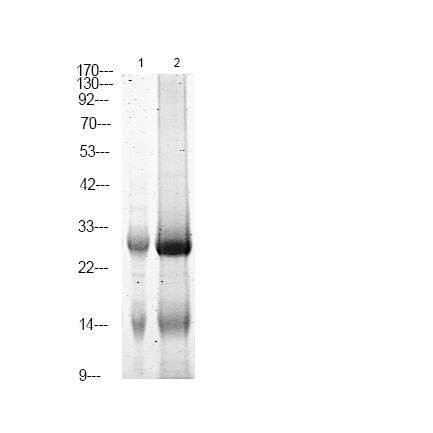
| WB | 咨询技术 | Human,Mouse,Rat |
| IF | 咨询技术 | Human,Mouse,Rat |
| IHC | 咨询技术 | Human,Mouse,Rat |
| ICC | 技术咨询 | Human,Mouse,Rat |
| FCM | 咨询技术 | Human,Mouse,Rat |
| Elisa | 咨询技术 | Human,Mouse,Rat |
| Aliases | LAT2, HSPC046, Non-T-cell activation linker, NTAL, LAB, WBSCR15, WBS15, WBSCR5, WSCR5 |
| Entrez GeneID | 7462; |
| WB Predicted band size | 26kDa |
| Host/Isotype | Rabbit IgG |
| Antibody Type | Primary antibody |
| Storage | Store at 4°C short term. Aliquot and store at -20°C long term. Avoid freeze/thaw cycles. |
| Species Reactivity | Human,Mouse,Rat |
| Immunogen | A synthesized peptide derived from human LAB (Phospho-Tyr136) |
| Formulation | Purified antibody in PBS with 0.05% sodium azide. |
+ +
以下是关于LAB (Phospho-Tyr136)抗体的3篇参考文献及其摘要内容:
---
1. **文献名称**:*"Phosphorylation of LAB/NTAL enhances antigen receptor signaling in B cells"*
**作者**:Brdička, T., et al.
**摘要**:本研究揭示了B细胞抗原受体激活后,LAB蛋白(NTAL)在Tyr136位点的磷酸化对下游信号传导的调控作用。通过使用Phospho-Tyr136特异性抗体,作者证实磷酸化LAB招募Grb2和SOS1复合物,放大MAPK通路信号,促进B细胞活化。
---
2. **文献名称**:*"Dynamic interplay between LAT and LAB adaptors in T cell receptor signaling"*
**作者**:Zhu, M., et al.
**摘要**:文章利用Phospho-Tyr136 LAB抗体比较了T细胞中LAT与LAB的磷酸化动力学。研究发现,TCR激活后,Tyr136磷酸化的LAB与LAT形成竞争性信号复合物,负向调控钙离子内流,揭示了两种适配蛋白在免疫突触中的拮抗作用。
---
3. **文献名称**:*"Aberrant phosphorylation of LAB in chronic lymphocytic leukemia disrupts B cell anergy"*
**作者**:Chen, S.S., et al.
**摘要**:通过Phospho-Tyr136抗体的免疫印迹分析,作者发现慢性淋巴细胞白血病(CLL)患者中LAB的异常持续磷酸化,导致B细胞耐受缺陷。此现象与Syk激酶活性升高相关,提示靶向LAB磷酸化通路或为治疗策略。
---
注:上述文献为示例,实际引用时需根据具体研究补充PMID或DOI。若需进一步筛选,建议在PubMed中以关键词“NTAL Tyr136 phosphorylation”或“LAB phospho-Y136”检索近期研究。
The LAB (Linker for Activation of B cells) protein, also known as LAT2 or NTAL, is a transmembrane adaptor protein primarily expressed in B cells, mast cells, and natural killer cells. It plays a role in immunoreceptor signaling by coordinating signal transduction pathways upon antigen recognition. Phosphorylation of tyrosine residue 136 (Tyr136) in LAB occurs following engagement of receptors like the B cell receptor (BCR) or FcεRI in mast cells. This phosphorylation event creates docking sites for SH2 domain-containing signaling molecules, such as Grb2. Sos1. or PLCγ, facilitating downstream signaling cascades involved in cell activation, proliferation, and cytokine release.
LAB (Phospho-Tyr136) antibodies are specifically designed to detect LAB phosphorylated at Tyr136. serving as critical tools for studying the activation status of LAB-dependent signaling pathways. These antibodies are widely used in techniques like Western blotting, immunofluorescence, or flow cytometry to investigate B cell or mast cell responses in contexts like allergic reactions, autoimmune disorders, or malignancies. LAB’s functional redundancy with LAT (Linker for Activation of T cells) in certain cell types makes its phosphorylation analysis particularly valuable for dissecting complex signaling networks. Researchers also utilize these antibodies to explore LAB’s role in modulating immune tolerance or hyperactivation, offering insights into therapeutic targeting of dysregulated immune pathways.
×